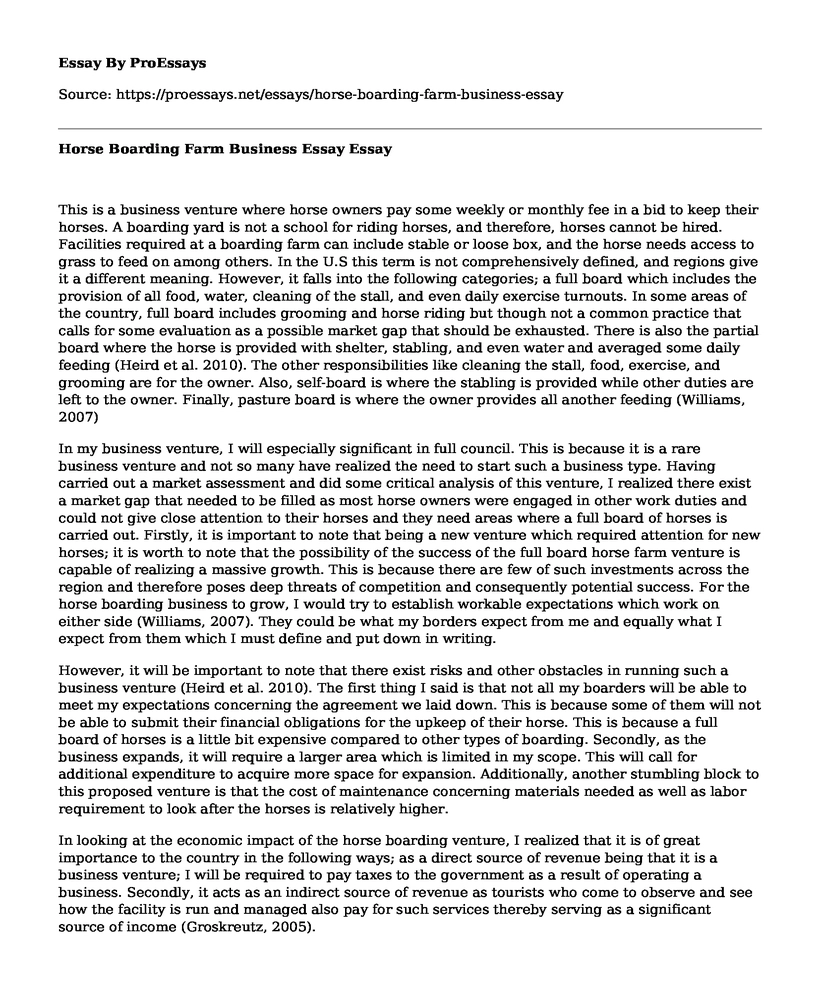This is a business venture where horse owners pay some weekly or monthly fee in a bid to keep their horses. A boarding yard is not a school for riding horses, and therefore, horses cannot be hired. Facilities required at a boarding farm can include stable or loose box, and the horse needs access to grass to feed on among others. In the U.S this term is not comprehensively defined, and regions give it a different meaning. However, it falls into the following categories; a full board which includes the provision of all food, water, cleaning of the stall, and even daily exercise turnouts. In some areas of the country, full board includes grooming and horse riding but though not a common practice that calls for some evaluation as a possible market gap that should be exhausted. There is also the partial board where the horse is provided with shelter, stabling, and even water and averaged some daily feeding (Heird et al. 2010). The other responsibilities like cleaning the stall, food, exercise, and grooming are for the owner. Also, self-board is where the stabling is provided while other duties are left to the owner. Finally, pasture board is where the owner provides all another feeding (Williams, 2007)
In my business venture, I will especially significant in full council. This is because it is a rare business venture and not so many have realized the need to start such a business type. Having carried out a market assessment and did some critical analysis of this venture, I realized there exist a market gap that needed to be filled as most horse owners were engaged in other work duties and could not give close attention to their horses and they need areas where a full board of horses is carried out. Firstly, it is important to note that being a new venture which required attention for new horses; it is worth to note that the possibility of the success of the full board horse farm venture is capable of realizing a massive growth. This is because there are few of such investments across the region and therefore poses deep threats of competition and consequently potential success. For the horse boarding business to grow, I would try to establish workable expectations which work on either side (Williams, 2007). They could be what my borders expect from me and equally what I expect from them which I must define and put down in writing.
However, it will be important to note that there exist risks and other obstacles in running such a business venture (Heird et al. 2010). The first thing I said is that not all my boarders will be able to meet my expectations concerning the agreement we laid down. This is because some of them will not be able to submit their financial obligations for the upkeep of their horse. This is because a full board of horses is a little bit expensive compared to other types of boarding. Secondly, as the business expands, it will require a larger area which is limited in my scope. This will call for additional expenditure to acquire more space for expansion. Additionally, another stumbling block to this proposed venture is that the cost of maintenance concerning materials needed as well as labor requirement to look after the horses is relatively higher.
In looking at the economic impact of the horse boarding venture, I realized that it is of great importance to the country in the following ways; as a direct source of revenue being that it is a business venture; I will be required to pay taxes to the government as a result of operating a business. Secondly, it acts as an indirect source of revenue as tourists who come to observe and see how the facility is run and managed also pay for such services thereby serving as a significant source of income (Groskreutz, 2005).
Conclusion
In conclusion, the horse boarding business especially full board requires close attention as the venture owner must always take care of the horses and give full attention to them. It, therefore, will need a junk of the time and dedication to run such a venture.
References
Kirby, A. T., Traub-Dargatz, J. L., Hill, A. E., Kogan, L. R., Morley, P. S., & Heird, J. C. (2010). Development, application, and validation of a survey for infectious disease control practices at equine boarding facilities. Journal of the American Veterinary Medical Association, 237(10), 1166-1172.
Groskreutz, C. G. (2005). Estimating the economic impact of the Georgia equine industry's trail riding and stable boarding sectors (Doctoral dissertation)
Hallberg, L. (2008). Walking the way of the horse: Exploring the power of the horse-human relationship. Universe.
Williams, B. H. (2007). Horses, Real Estate and The Hobby Loss Debate. Nabet, 86.
Cite this page
Horse Boarding Farm Business Essay. (2022, May 26). Retrieved from https://proessays.net/essays/horse-boarding-farm-business-essay
If you are the original author of this essay and no longer wish to have it published on the ProEssays website, please click below to request its removal:
- Global Leadership & Cultural Intelligence: Annotated Bibliography
- Strategic Management: Case Analysis of McDonald's Paper Example
- Project Management 18 Reflection Paper Example
- A Change Management Perspective and Impact of Information Technology on Customer Service
- Ocasio-Cortez - Essay Sample
- Sustainable Business: Meeting Current Needs Without Hurting Future Interests - Essay Sample
- Paper Example on Create Change Management Plan to Ensure Successful Change Initiatives







